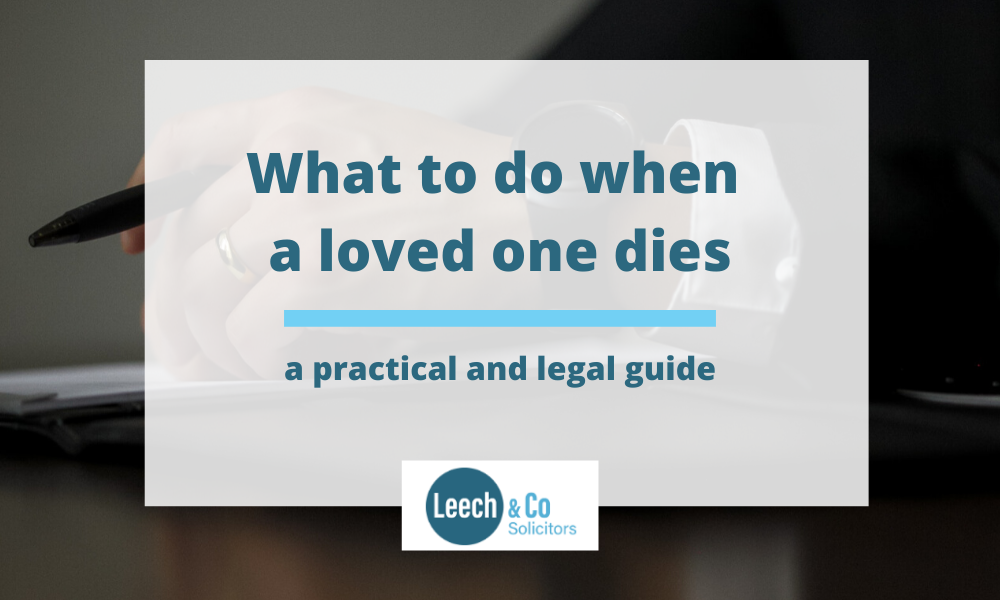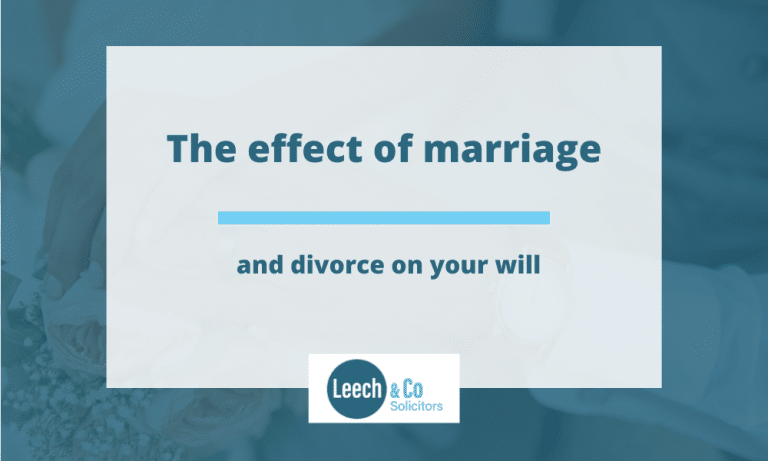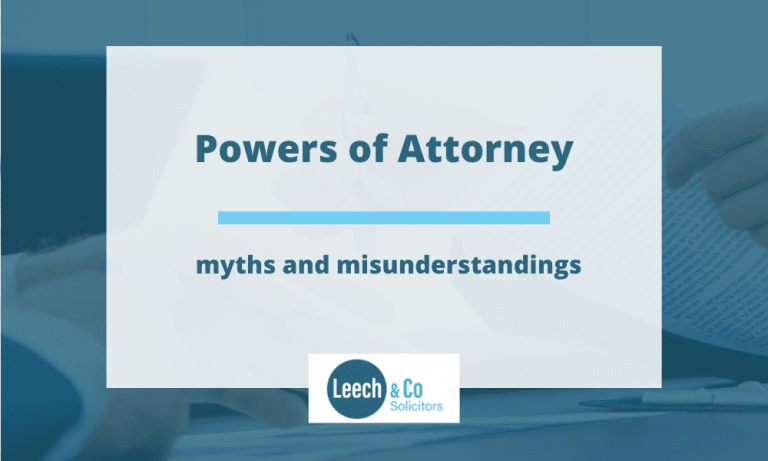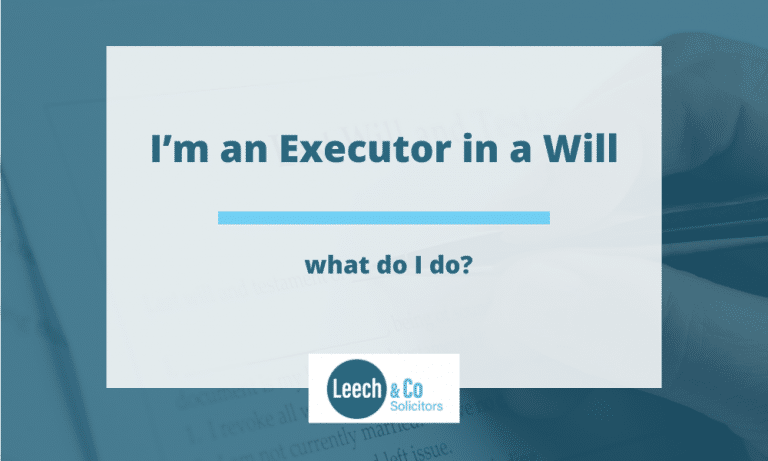My parent / husband / wife / relative has died, what do I do now?
I’m an Executor in a Will, what do I do?
There is no Will / we can’t find a Will, what do I do?
What is a Grant of Probate and do I need to get one?
I’m an Executor in a Will, how do I administer an Estate?
When a loved one dies, there are practical, financial and legal matters that need to be addressed.
We have set out below the steps you need to take when a loved one dies, but if you would like to talk things through with one of our friendly team for free, initial advice please call 0161 749 9000 or free, initial advice please call 0161 749 9000 / 07572 373 813 or visit our website www.leechandco.co.uk for further information.
Leech & Co can advise and assist you every step of the way to make sure all necessary steps are taken, your loved one’s wishes are carried out and their Estate is correctly administered and concluded.
My loved one has died – what do I do first?
When a loved one dies, clearly the most important things to do are to look after family and friends and look after yourself. The grieving process will obviously be emotional and it can be complex and lengthy.
However, there are three main practical things to do when a loved one has died that can reduce the stress and anxiety of what will be an emotionally traumatic time:
1. Register the death:
If your loved one died at home, notify the GP to secure the body and to get a medical certificate to confirm the death. If your loved one died at hospital, the hospital staff will take care of this for you. You will need the medical certificate to register the death with your local Register Office. This needs to be done within 5 days of the death (8 days in Scotland).
2. Secure paperwork and valuables:
Make a search of your loved one’s home to obtain all relevant paperwork i.e. the Will, Funeral Plan, letter of wishes about the Funeral, financial documents etc. If your loved one lived alone, secure all valuables and cash in the house. You need to make a list of all cash and valuables. Ideally, you should do this with someone else to witness which items have been secured
3. Contact relevant people to help you:
- Funeral Director: to confirm your loved one’s death and to arrange the Funeral. If your loved one had a Funeral Plan, the paperwork should be in the house and you simply need to contact the Funeral Director on the paperwork. If you would like to find out more about Funeral Plans, we can assist you with this – find out more here [need link to Funeral Plan section on website]
- Government: to notify all relevant Government departments of your loved one’s death in relation to tax, benefits, passport, driving license, the local Council etc. You can notify the Government using this online link – https://tell-us-someone-died.dwp.gov.uk/death/enrich/recover – or call the local Government office (the registrar will provide this number when you register the death)
- Solicitor: to help you with the Estate and legal matters (see below);
If you would like help with these initial steps, please call one of our friendly team for free, initial advice on 0161 749 9000 / 07572 373 813 or explore our website for further information.
We have detailed below the legal steps you need to take to deal with your loved one’s Estate.
Again, Leech & Co can advise and assist you every step of the way to make sure all necessary legal steps are taken and the whole process is as straightforward and stress-free as possible.
My loved one has died – what are the first steps to take to deal with the Estate?
The first step to deal with the Estate is to try to locate the Will. Your loved one may have left instructions as to how to locate it so talk to your family to confirm where it is. It may simply be in your loved one’s house or with a local Solicitor so you’ll need to have a search of your loved one’s paperwork to try to locate it. It may have been registered with Certainty National Will Register (www.nationalwillregister.co.uk) which will tell you which Solicitor drafted the Will.
My loved one has died and has appointed me as an Executor of the Will – what do I do first?
If you have been appointed the Executor in your loved one’s Will, it will be your responsibility to administer the Estate. The Estate is the term for your loved one’s property, money and possessions.
The process of administering the estate will generally begin with obtaining a Grant of Probate. This is an official legal document that confirms you, as the Executor, have the authority, as provided in the Will, to deal with your loved one’s personal and financial affairs. The Grant of Probate is obtained by an application to the Probate Registry. (Here is a link to the Government’s Probate Registry website – Applying for probate – GOV.UK )
The Grant of Probate will be required by banks, building societies and/or mortgage companies etc to allow them to deal with you as the Executor in relation to your loved one’s accounts, property etc.
Do I definitely need to apply for a Grant of Probate?
A Grant of Probate is generally needed to administer an estate, but not always. Some banks and building societies will allow you to deal with the money and accounts of your loved one without a Grant of Probate, but this is generally only if the amounts in the accounts are less than £15,000.00. If the amounts in the accounts are more than £15,000.00 or if the estate contains property, then it is likely the Executor will be required to apply for a Grant of Probate.
My loved one has died, but there is no Will – what do I do first?
If your loved one died without a Will, the Estate will be administered according to the law of Intestacy. The law will also determine which of your loved one’s relatives is entitled to administer the estate. These will be called the Administrator rather than the Executor.
If there is no Will, the first step to deal with the Estate is to apply to the Probate Registry (– Applying for probate – GOV.UK) ,but for a Grant of Letters of Administration rather than a Grant of Probate. The person named in the Grant of Letters of Administration i.e. the Administrator, will then be able to deal with the estate.
Here is guidance from the Government’s website about the Laws of Intestacy: Intestacy – who inherits if someone dies without a will? – GOV.UK However, it’s likely you’ll need the assistance of a specialist Wills and Probate solicitor if there is no Will to make sure the Estate is administered correctly. Call one of our friendly team on 0161 749 9000 / 07572 373 813 or visit our website – www.leechandco.co.uk – for further details.
I have obtained the Grant of Probate – what do I do now?
When the Grant of Probate has been obtained, you, as the Executor, can then administer the Estate of your loved one. This process generally has three stages:
- Assessing the value of the estate by obtaining all documents in relation to your loved one’s property, finances, possessions etc;
- Paying any outstanding bills and settling all debts with the money in the estate;
- Distributing the balance of the estate i.e. what is left after the debts have been paid, in accordance with the terms of your loved one’s Will.
If your loved one had specific requests in their Will, for example that a specific item is to be given to a certain person, it is your responsibility as the Executor to ensure that person receives that item.
As the Executor, you will also need to prepare Estate Accounts to confirm how the estate has been administered. Therefore, you will need to document everything you do, obtain confirmation of payment of bills and debts and obtain receipts for any payments.
I have obtained the Grant of Probate / Grant of Letters of Administration – how do I administer the Estate?
The administration of the estate can involve legal, financial and tax issues and can become a complex, lengthy and time-consuming matter. All estates will be different, but administering them will generally include some or all of the following aspects:
- Identify all of your loved one’s assets and their debts and liabilities. This is to calculate the value of the estate. It will involve identifying and contacting all banks, building societies and companies to confirm the assets held by them. If the estate includes property, this will involve obtaining professional valuations of the property and/or or personal possessions;
- Submit an inheritance tax return to the Probate Registry even if there is no tax due to be paid. If inheritance tax is due to be paid, then this must be paid from your loved one’s estate;
- Liquidate the assets of the Estate, for example sell or transfer property, close bank accounts, collect in the proceeds of investments, life insurance policies etc;
- Pay the debts and liabilities of the Estate (including any tax);
- Distribute the balance of the estate in accordance with the terms of the Will (or, if there is no Will, the Intestacy Rules) to the Beneficiaries;
- Prepare Estate Accounts.
Who pays to administer the Estate?
The legal fees for obtaining the Grant of Probate and administering the Estate are paid for from the Estate and not by you as the Executor.
How can Leech & Co help you with the Grant of Probate and administering the Estate?
As an Executor, you can apply for the Grant of Probate and administer the estate yourself without assistance from a Solicitor, but we would not advise that you do this. It can be a complex, lengthy and time-consuming process with multiple stages, forms to complete, inheritance tax issues to consider and different banks, building societies and companies to deal with. An error at any stage or with the forms can delay the process and administering the Estate incorrectly could lead to your actions being legally challenged.
Also, as the Executor of a loved one’s Will, it will be an emotional time for you coming to terms with your loss. Therefore it is likely you will need assistance dealing with the issues and the work involved.
Leech & Co can help you, as the Executor, to navigate this process as quickly and efficiently as possible. We will come to you to discuss the matter with you and we will advise and assist you every step of the way until the administration of the Estate is complete. Call us on 0161 749 9000/ 07572 373 813 or click here to request a call back.
We are happy to deal with the whole process for you in accordance with your instructions, but we are also happy to assist you with a part of the process only. We can discuss the costs of assisting you when we have met you, discussed the matter in detail and confirmed your instructions.




